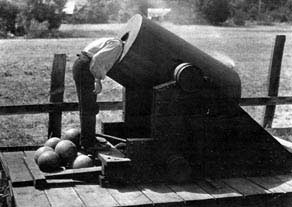 I read Mark Danner's New York Review of Books piece on the Iraq war. He reviews "State of Denial: Bush at War, Part III" by Bob Woodward, "The One Percent Doctrine: Deep Inside America's Pursuit of Its Enemies Since 9/11" by Ron Suskind and "State of War: The Secret History of the CIA and the Bush Administration" by James Risen.
I read Mark Danner's New York Review of Books piece on the Iraq war. He reviews "State of Denial: Bush at War, Part III" by Bob Woodward, "The One Percent Doctrine: Deep Inside America's Pursuit of Its Enemies Since 9/11" by Ron Suskind and "State of War: The Secret History of the CIA and the Bush Administration" by James Risen.It creeped me out.
The Washington policy apparatus that has been in place for decades has been cut out of the loop by the Bush administration, seen as an impediment to decisive action. The policy shops still functioned, but were talking to themselves. "Rice said the interagency was broken," Woodward reports.
Suskind elaborates:
Sober due diligence, with an eye for the way previous administrations have thought through a standard array of challenges facing the United States, creates, in fact, a kind of check on executive power and prerogative."There was never any policy process to break, by Condi or anyone else," Richard Armitage, the former deputy secretary of state told Suskind. "Bush didn't want one, for whatever reason."
. . .
For George W. Bush, there had been an evolution on such matters — from the early, pre-9/11 President, who had little grasp of foreign affairs and made few major decisions in that realm; to the post-9/11 President, who met America's foreign challenges with decisiveness born of a brand of preternatural, faith-based, self-generated certainty. The policy process, in fact, never changed much. Issues argued, often vociferously, at the level of deputies and principals rarely seemed to go upstream in their fullest form to the President's desk; and, if they did, it was often after Bush seemed to have already made up his mind based on what was so often cited as his "instinct" or "gut."
Suskind continues:
Of the many reasons the President moved in this direction, the most telling may stem from George Bush's belief in his own certainty and, especially after 9/11, his need to protect the capacity to will such certainty in the face of daunting complexity. His view of right and wrong, and of righteous actions— such as attacking evil or spreading "God's gift" of democracy—were undercut by the kind of traditional, shades-of-gray analysis that has been a staple of most presidents' diets. This President's traditional day began with Bible reading at dawn, a workout, breakfast, and the briefings of foreign and domestic threats.... The hard, complex analysis, in this model, would often be a thin offering, passed through the filters of Cheney or Rice, or not presented at all.Danner explains,
[T]he War of Imagination draped all the complications and contradictions of the history and politics of a war-torn, brutalized society in an ideologically driven vision of a perfect future.Whether or not "The Decider" knew what he was doing or not.
. . .
If the sober consideration of history and facts stood in the way of bold action then it would be the history and the facts that would be discarded. The risk of doing nothing, the risk, that is, of the status quo, justified acting.
I had a vision of George W. Bush as "Johnny Gray," the locomotive engineer in Buster Keaton's "The General" (1927). A locomotive chase ensues after yankee spies steal Johnny's engine and kidnap his girl, although has no plan for what to do if he should actually catch them.
Through a series of accidents this hapless "man of action" finds himself in the middle of a battle wearing a Confederate uniform and an officer's sword belt. Whenever he is at a loss for what to do, he draws the sword. He finds that men rally around whenever he brandishes it authoritatively. Not that he has any idea what to do with it.
Only his own dumb luck keeps Johnny Gray from being killed (because Keaton, of course, wrote, directed and acted the role). Bush, if well-intentioned, is not so skilled as Keaton, but just as clueless as Johnny Gray. Only, the deaths in the Iraq tragicomedy are real.
UPDATE:
The December 2006 National Geographic magazine shows the costs of the Iraq debacle in the black and white in the photo gallery for the article, Iraq War Medicine.
No comments:
Post a Comment